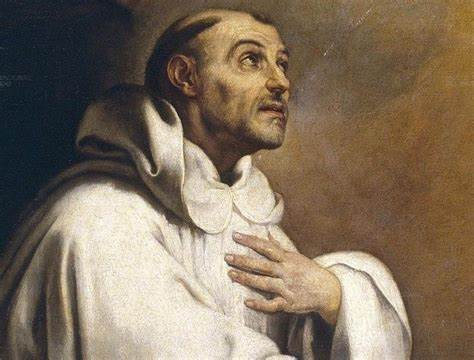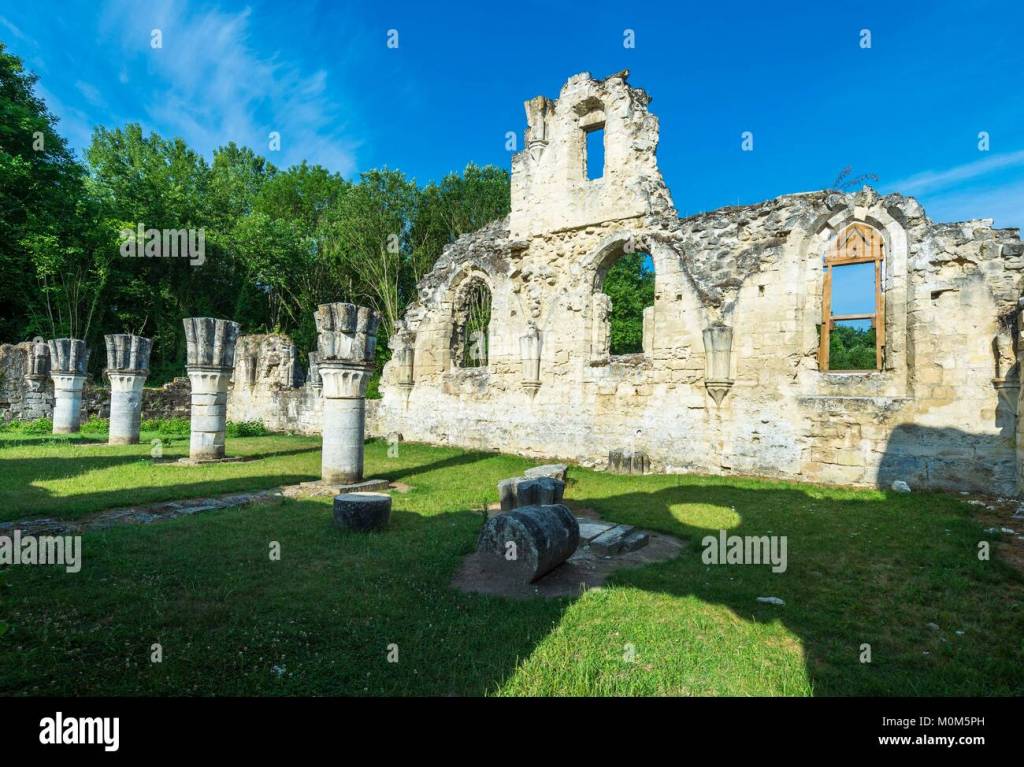
This man, whose feast day is August 20th (today, as I write) was the man with the golden touch, the man who could do everything, the go-to man for popes and kings. He was the most influential man in all of Europe in his day. And probably the holiest as well. Here is a bit of his story, with a twist on the Crusades that flows from his life:
Just before the dawn of the 12th century, some reform-minded Benedictine monks started a new monastery in the French town of Citeaux. A few years later, a young man of a noble family from nearby Dijon, tired of a frivolous youth, gathered some friends and family and joined the monks at Citeaux. This was the beginning of the remarkable career of Saint Bernard of Clairvaux (1090-1153).
After three years, his superiors at Citeaux, impressed with this devout and gifted young man, sent Bernard off to found a new monastery. Taking a number of monks with him, Bernard did so, and named it Clairvaux (ruins of his abbey pictured below). He would remain as abbot of Clairvaux for the rest of his life. From there, he built the Cistercians into a flourishing monastic order, and a movement that spurred renewal of Christian faith throughout the West.
Picking up from the reform movement of the Cluny monks decades earlier, Bernard proceeded to send monks out to found new Cistercian monasteries throughout the continent. Eventually over 160 were founded. Bernard fostered a stricter version of Benedict’s Rule and emphasized holiness of life. It worked, attracting aspiring monks by the thousands, as the Cluny movement had earlier. It is hard to fathom today, but these monastic spiritual movements made a huge difference in the spiritual life of the Christians of the time.
As Bernard methodically built the Cistercian order, his reputation grew – a reputation for wisdom and holiness. People in high places noticed him, called upon him for help, and this led to a burgeoning career as a do-everything man throughout Europe, above and beyond the significant work of spreading the faith via his Cistercian order.
Bernard was successful for several reasons. He was a gifted preacher and writer; he could organize and inspire; he was wise; and he harbored a deep passion for souls. Above all, Bernard was a holy man. His secret was that he loved God, was devoted to Christ and the gospel, and had a profound reverence for the Virgin Mary. Holiness attracts.
Bishops, kings, and popes called upon him for advice. He helped to resolve a schism over a selection of a pope; he mediated disputes between major city-states and nobles; he prepared the outline of the Rule for the Knights Templar; he fought against various heresies; he intervened to put a stop to pogroms against Jews in the Rhineland as a crusade was embarking; and he was a tremendous preacher who inspired thousands. Even miracles were attributed to his activities. That’s a lot for one man. That’s why I call Bernard the man with the golden touch.
Despite all his accomplishments, it may be his biggest failure that resonated throughout his century. Bernard lived during the era of the Crusades, and he believed in the crusading enterprise to recapture the Holy Land. Pope Eugene III, whom years before Bernard had taken in as a monk at Clairvaux (yes, Bernard was a pope-maker, too), asked Bernard to preach the Second Crusade. It appeared that the territorial gains in the Holy Land of the First Crusade were in danger. At a field in Vezelay in France, in the year 1146, Bernard delivered a sermon so rousing that thousands signed up for the crusade – both on the spot and in the weeks ahead as word spread. Not long after, an impressive army of thousands, led by royalty from all over Europe, marched off with great fanfare to do battle in the Holy Land. Hopes were high with the divine blessing that Bernard had preached. It was not to be. The Second Crusade was a disaster. It accomplished nothing other than the loss of thousands of lives.
The man with the golden touch had been wrong. He apologized to the pope (although it was the pope who put him up to the task) and also blamed the failure on the sins of the crusaders, which was perhaps not the most gracious response from this holy but still human man.
We can take three things from this. First, success is never assured in this fallen world. As St. Mother Teresa has said, we are called to be faithful, not successful. Bernard did his best to be faithful, but he was not infallible or all-knowing, and though a great man, still a man of his times caught up in the crusading spirit. Second, about this “crusading spirit.” It was real. It grew out of the spiritual energy which the Cluny and Cistercian movements and other genuine reformers helped to generate. For crusades to be possible, be they wise or not, a strong faith has to be present among the Christian people. It was. Thousands don’t leave everything behind go to another continent where, even if they make it, they may die, unless motivated by great zeal and a strong faith in God. This was the age of reform and renewal and spiritual energy. And Bernard had played a pivotal role in fostering it.
Third, even if the various crusades were ill-conceived or poorly carried out, the whole crusading enterprise preserved, and even enhanced the spiritual energy in the Church through the12th and into the 13th century. Kings and serfs, clergy and lay, popes and monks embraced a deeper, if imperfect faith in this crusading era. The crusades affected everyone: participants who traveled as warrior-pilgrims to the Holy Land and those who stayed home, welcoming back those who returned and mourning those who did not. The 13th century, which followed the first four crusades, was the century of Saints Francis and Clare, Bonaventure and Anthony of Padua, Dominic and Albert the Great and Thomas Aquinas. It is considered a high-mark in all Church history for devotion and spiritual energy. The zeal for faith which the crusading spirit generated in St. Bernard’s 12th century helped to prepare the way. The seeds for the conversion of so many people at the preaching of these great saints were sown in the previous century, in the crusading century, in St. Bernard’s century. That’s how church history works. So, like St. John the Baptist, Bernard’s preaching of the Second Crusade may not have led to military success, but it did help to prepare the soil for the ministries of other great saints to follow.
And that, my friends, is what it is truly about.


Add Comment